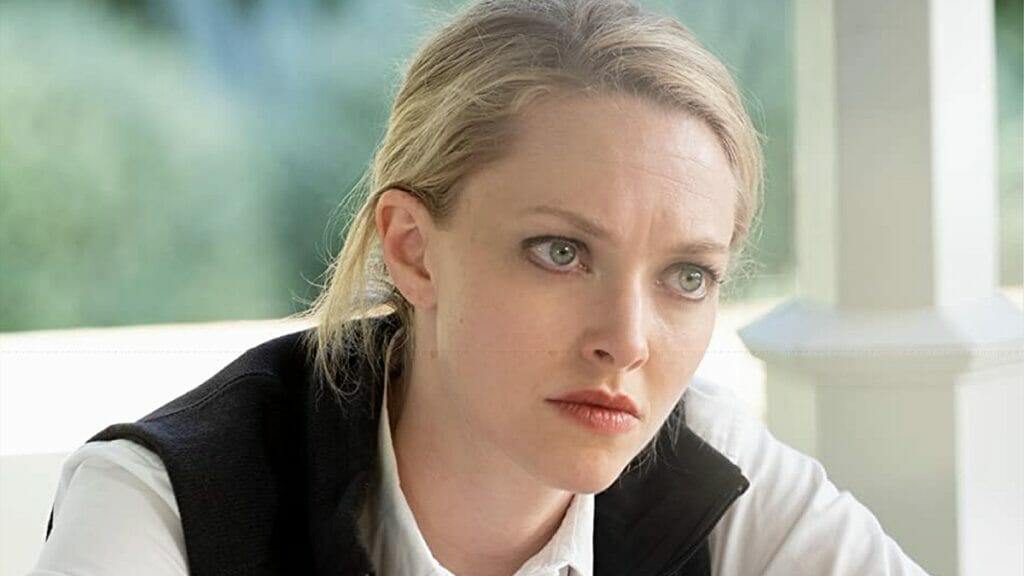Read also:
How to Watch FX Live Without CableHow To Watch AMC Without CableHow to Watch ABC Without CableHow to Watch Paramount Network Without CableAtom Egoyan’s latest doesn’t hide from academic sincerity.
This piece was written during the 2023 SAG-AFTRA strikes. Without the labor of the actors currently on strike, the works being covered here wouldn’t exist.
In the 2010s, Atom Egoyan fell by the wayside in my ‘auteurs to keep an eye on’ radar rather rapidly. The last film I saw from him, The Captive, starring Ryan Reynolds, proved such an impenetrable slog that I couldn’t go back to him for a while. I remember The Sweet Hereafter and Exocita being formative films of my adolescence. I count them among the first to push the boundaries of what cinema ‘was’ to me. The former, especially, had such a hypnotic visual and audial style tied to such a potent mythic metaphor – The Pied Piper of Hamelin – that I couldn’t stop thinking about it for long after.
I’m therefore happy to say that Egoyan’s latest film, Seven Veils, elicited a similar feeling. It’s a movie that has been on my mind nearly every day since seeing it at TIFF.
To say that Egoyan is going back to his roots with this film is doing it a disservice. As with many other filmmakers at this year’s festival, including Godard, Mendonça Filho, and Victor Erice, Egoyan’s film catapults his 90’s work into the 21st century. It’s not a rehash, a recreation of something done previously. He’s not transporting us back to ‘when he was good’ for nostalgia’s sake. Seven Veils is actively concerned with how to grow something new out of old roots.

The film focuses on a young woman theater director, Jeanine (Amanda Seyfried in the best performance of her career). She’s remounting a production of Richard Strauss’s opera based on Oscar Wilde’s play Salome, an obsession of her former mentor and lover Charles. Seyfried plays Jeanine with a deft complexity that exudes a comical self-assuredness as things–her romantic, familial, and working relationships–either slowly fall apart or grow ever more evident. She also locates the character’s desperate need for distinguishment. She struggles in constant conflict. On the one hand, she wants to distance her vision of Salome from her mentor. On the other, she hungers to please him.
Seyfried’s voice, used extensively in contemplative voice-overs throughout the movie, is angelic and young – that of someone who still considers themselves a student. But when explaining her vision for play to her cast and crew, she’s exasperating, falling on her knees, pleading with her arms and hands. It’s a deeply personal act.
It’s a movie that has been on my mind nearly every day since seeing it at TIFF.
So, too, for Egoyan. Seven Veils distances itself from Egoyan’s early career – there is a whole cancel-culture sub-plot that jeopardizes the play – while also actively embracing those aesthetics. Egoyan’s uses of shadow and light never look ‘stagey’ despite the play as the film’s central concern. He incorporates a purely cinematic aesthetic, turning the drapery and the architecture of the stage to align his camera in radical ways and from various angles that give a three-dimensionality to its characters. He pans and tilts throughout the performances, evoking beautiful blocking between the actors and engulfing the frame in projected imagery. He juxtaposes these with DV camera footage that layers textures over each other, symbolizing the constant battle between the past and the present within the film.
At times, it can get a bit on the nose. The sequences where the Salome production begins to feel eerily like old videos Jeanine’s father shot of her is especially guilty. Still, like Todd Fields’ Tar, Seven Veils doesn’t beat around the bush in depicting its central figure’s academic sincerity.